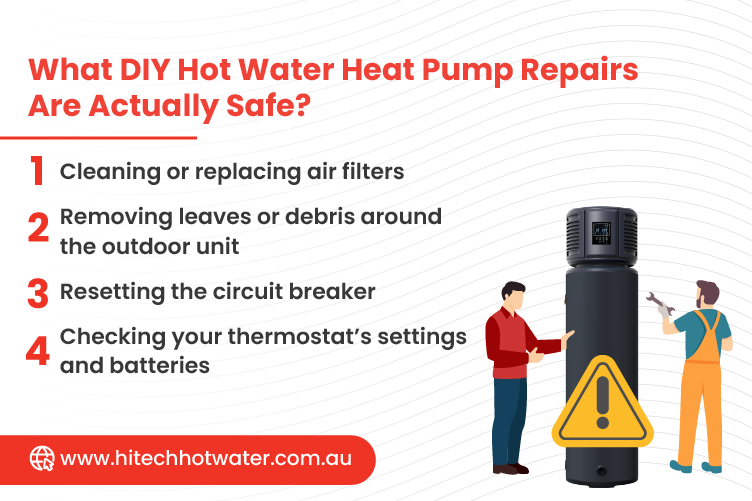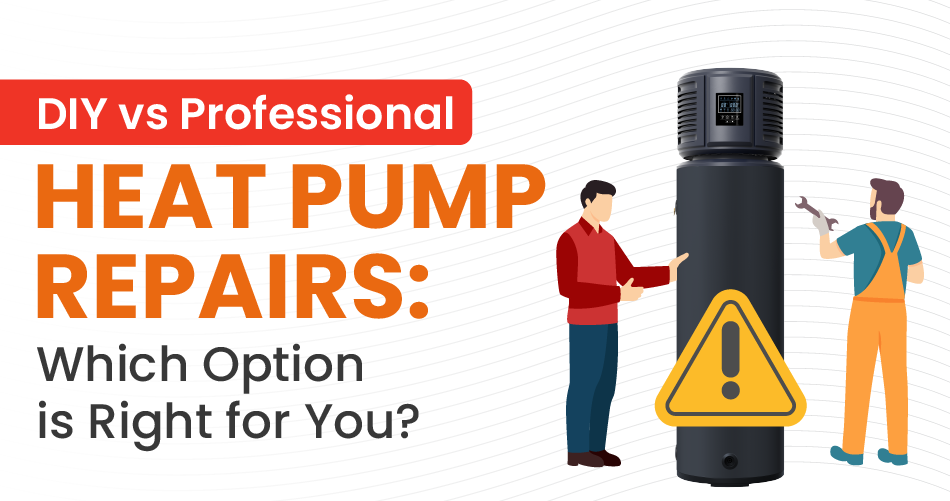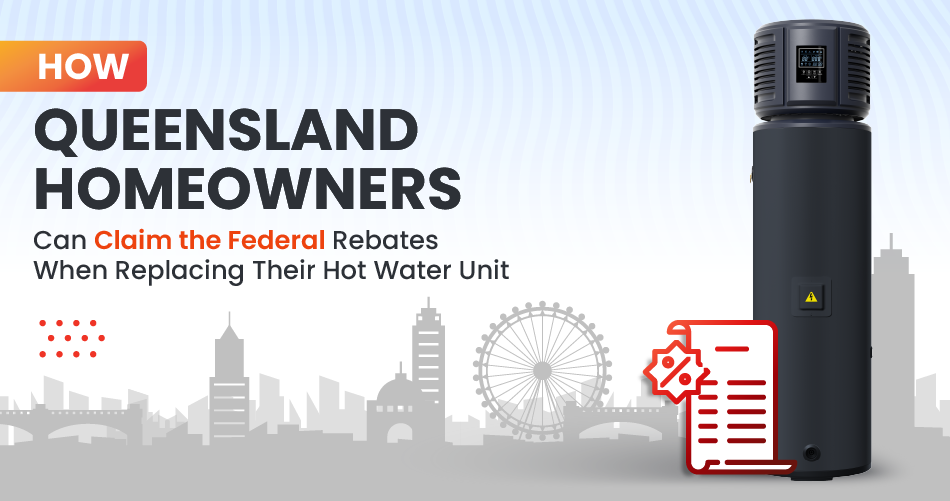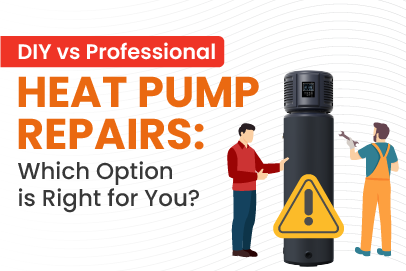Heat pumps are praised across Australia for their energy efficiency, low running costs, and year-round comfort. But like any appliance, they’re not immune to faults.
Whether it’s weak airflow, a strange noise, or a complete breakdown, every heat pump owner eventually faces the question: Should I fix it myself or call in the experts?
Now, we’ll walk through common issues, the pros and cons of each approach, and when it’s time to choose between DIY vs professional heat pump repair.
Common Heat Pump Problems You Might Encounter
Understanding what can go wrong is the first step to making the right repair decision. Some of the most common problems Australian homeowners report include:
- Weak or uneven heating and cooling
- Strange noises like hissing, grinding, or clicking
- Poor airflow or blocked vents
- Frozen coils
- Tripped circuit breakers or wiring faults
- Unresponsive or inaccurate thermostats
Many of these issues may seem minor but can indicate deeper faults. The question is—which ones can you tackle yourself, and which require expert attention?
The Appeal of Doing It Yourself
There’s no doubt that DIY heat pump repair can be tempting. If you’re handy and enjoy solving problems, a few quick fixes might save you both time and money.
Benefits include:
- Avoiding labour costs
- Immediate action—no need to book an appointment
- A sense of satisfaction from resolving the issue yourself
- Gaining valuable knowledge (especially with a good heat pump repair DIY guide)
But DIY Has Its Limits
Despite the advantages, there are serious downsides to consider.
Risks include:
- Limited access to tools and diagnostic equipment
- Voiding your warranty if you do something wrong
- Safety hazards like electric shock or refrigerant exposure
- Misdiagnosis leading to worse problems later
A common mistake many homeowners make is applying a temporary fix that masks a bigger issue—often ending in more expensive repairs down the line.
What DIY Hot Water Heat Pump Repairs Are Actually Safe?

Not all tasks are off-limits. You can confidently handle simple maintenance jobs like:
- Cleaning or replacing air filters
- Removing leaves or debris around the outdoor unit
- Resetting the circuit breaker
- Checking your thermostat’s settings and batteries
These don’t require specialised knowledge, and they’re part of general system upkeep anyway.
When You Should Choose Professional Repairs
When things go beyond basic maintenance, it’s time to call for professional heat pump repair services. Licensed technicians are trained to identify and fix issues without damaging your system—or putting your safety at risk.
The advantages of going pro:
- Expertise in diagnosing complex faults
- Proper tools for testing and repair
- Warranty and insurance coverage
- Access to official replacement parts
- Peace of mind that the job’s been done right
When DIY Stops Being Enough
Call a technician if:
- You smell burning or hear loud electrical noises
- There’s water or refrigerant leaking from the unit
- The system keeps short cycling
- Components like capacitors, motors, or compressors need replacing
- Your heat pump is still under warranty
DIY Professional Heat Pump Repair: The Warranty Factor
One often overlooked issue is how repairs impact your warranty. Most manufacturers require that major repairs be completed by licensed professionals. Attempting DIY heat pump repair without understanding your system’s coverage terms can void your protection and leave you paying out of pocket for future problems.
Your safety matters too. Modern heat pumps are advanced electrical and refrigerant systems—not something to poke around in without training.
The Hidden Costs of DIY That Most Homeowners Overlook
At first glance, DIY vs professional heat pump repair seems like ends apart, fixing a heat pump yourself seems like a smart, budget-friendly option. But many Australian homeowners underestimate the hidden costs of DIY attempts—costs that may not appear until weeks or even months later.
Here’s what often goes unnoticed:
- Energy Inefficiency: A misaligned sensor or partially blocked coil may seem like a minor issue—but over time, it can increase your energy usage significantly. What looked like a $0 fix may quietly add $100+ to your annual power bill.
- Accelerated Wear & Tear: Poorly executed repairs can put extra strain on components. For example, failing to tighten a motor bracket properly could lead to early failure—shortening your heat pump’s lifespan.
- Emergency Callouts: When comparing DIY vs professional heat pump repair, if your DIY fix fails during peak summer or winter, you may be forced to book an urgent repair. Emergency callouts often cost significantly more than standard appointments.
- Lost Rebates or Insurance Claims: In some Australian states, rebates or home insurance claims may be invalidated if repairs are done by someone unqualified. That “free fix” could cost you hundreds in lost incentives.

Final Thoughts: Which Is Right for You?
If you’re debating DIY vs professional heat pump repair, here’s the breakdown:
- Choose DIY only for safe, simple maintenance like cleaning filters or clearing blockages.
- Opt for professional heat pump repair services when faults go deeper, involve electricity or refrigerant, or require diagnostic tools.
- Always check your warranty terms before opening the unit.
Maintaining a heat pump is part of owning one and knowing when to step back and call a pro can save you time, money, and stress.
Need expert help? Visit HiTech Hot Water to explore our proficient heat pump repair services, maintenance packages, and smart heat pump upgrades.
Frequently Asked Questions (FAQs)
Cleaning air filters, removing debris around the unit, and checking thermostat settings are generally safe DIY tasks.
In the short term, yes, but incorrect repairs can lead to bigger costs. Professional fixes come with warranty protection and long-term reliability.
Yes. If the repair involves internal components or refrigerant, DIY work can void your manufacturer warranty.
If the problem persists, involves electrical faults or refrigerant leaks, or your system is still under warranty call a licensed technician.
Absolutely. Certified technicians provide expert diagnosis, permanent fixes, and peace of mind, especially for critical heating or cooling issues.






